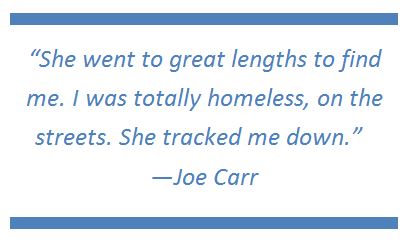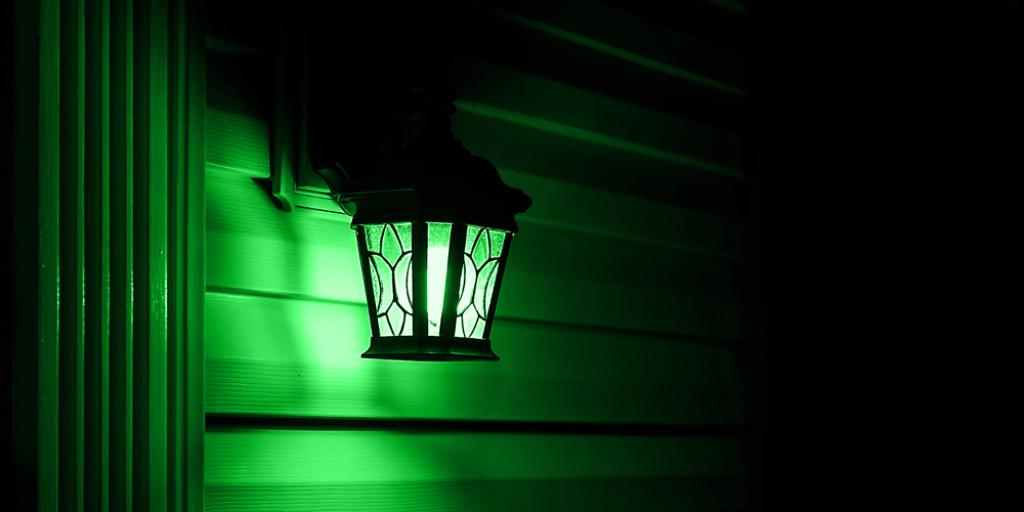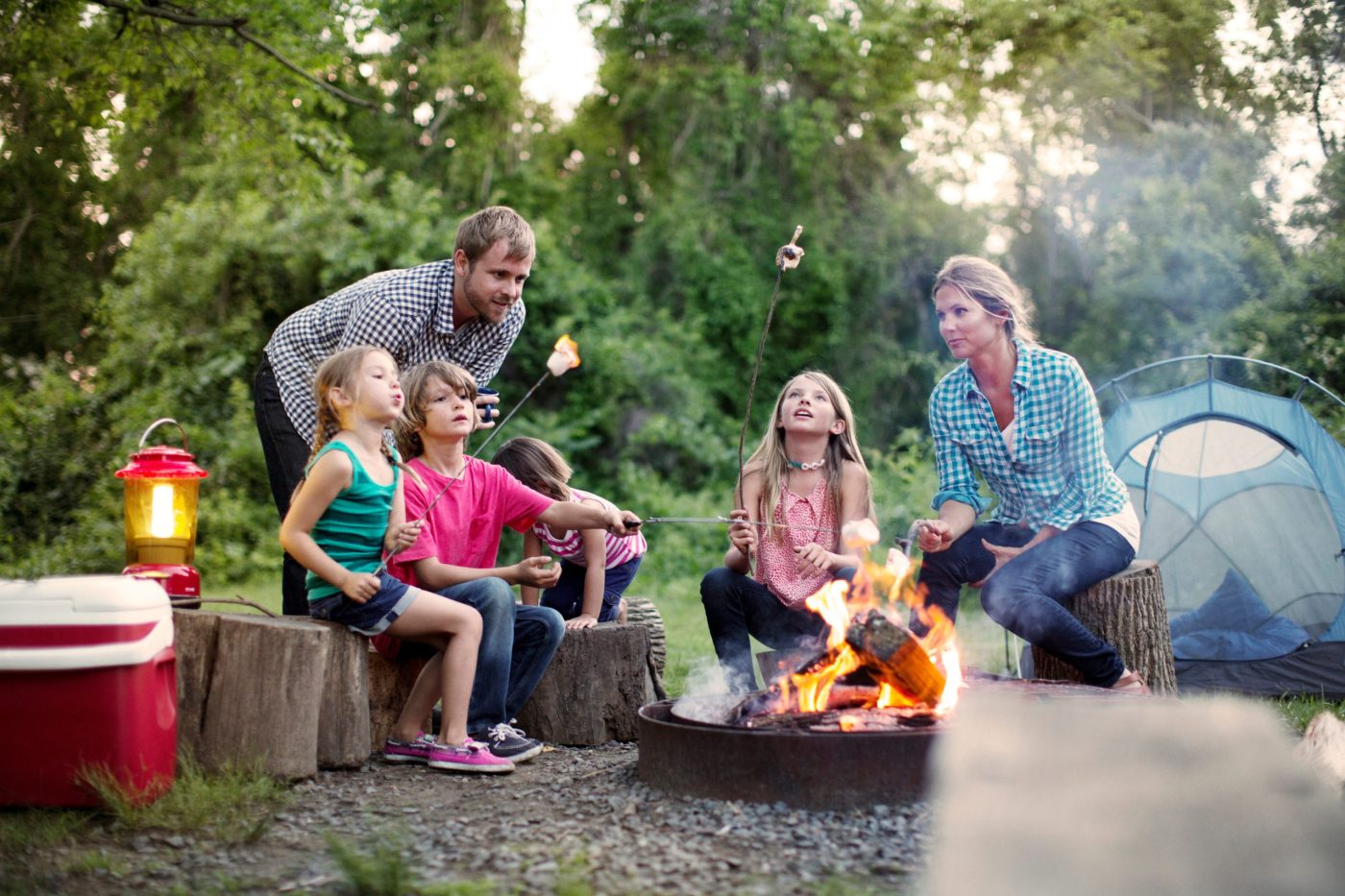
Touched by an Angel —-Joe Carr and his VA social worker, Kelly Estle. (Photo/Angela Levins, AL.ABAMA Media Group, www.al.com used with permission)
Joe Carr was a tank company commander in Vietnam. During his 18 months there, he earned a number of medals for his valor, as well as a purple heart.
After leaving the military, he worked 35 years as an attorney with Legal Services in Mobile, Ala., helping poor people with their civil cases.
Then the wheels abruptly came off. His wife got sick. There were money troubles. In the end, Joe Carr woke up one morning and found himself hung over and homeless.
“I fell off the wagon,” Carr said. “We all make mistakes.”
Upon further reflection, he said, “I came back from Vietnam with both my arms and both my legs. But I was suffering on the inside, badly.”
Salvation
Carr’s fortunes had turned south. He knew he was in a bad way. What he didn’t know was that someone was looking for him.
“The homeless community in Mobile is pretty tight-knit, so the guys will tell me whenever someone new shows up in town,” said Kelly Estle, a social worker with the Gulf Coast VA.
 But the homeless grapevine isn’t her only means of finding and helping down-and-out Veterans in the area. She also has friends at every social service agency in town.
But the homeless grapevine isn’t her only means of finding and helping down-and-out Veterans in the area. She also has friends at every social service agency in town.
“There’s the Salvation Army shelter,” she explained, “and the Waterfront Rescue Mission, and Fifteen Place, a day shelter. When a Veteran walks in one of these places, someone there calls me.
“I also get a lot of referrals from our own VA outpatient clinic here, as well as the local VFW and American Legion,” she added. “I’ve been a social worker here for 20 years. Mobile is small, so when you’re here for 20 years, everybody knows you.”
One day Estle learned about Joe Carr. One of her numerous contacts in town had tipped her off about him, and where he happened to be at that precise moment: the shelter at the Salvation Army.
“They start lining up there about 3 o’clock in the afternoon to make sure they get a cot for the night,” she explained.
And There She Was
“I was sitting out on a bench there, in the cold,” Carr said. “The director came out and said: ‘Joe, there’s a good-looking woman here to see you.’ So I went inside and there was Kelly.”
“Joe looked pretty bad,” Estle admitted. “I enrolled him in the VA at 5:30 that afternoon.”
“I was extraordinarily depressed,” Carr admitted. “I was suicidal. I was a mess.”
“The next morning, I made sure he was seen by our primary care people here at the Mobile clinic,” Estle said. “Then he saw an addictions counselor. Next, I got him into a homeless shelter where I knew he’d be safe until I could get him to in-patient care at our Biloxi VA.”
“She brought me to a shelter here in Mobile so I could get warm and dry,” Carr said. “What a good lady. She’s my guardian angel. That’s not an overstatement at all.
“She made sure I got the medical attention I needed. She got me into rehab. She found me a place to live. All the problems I had, she addressed. I am in deep gratitude for what she did for me, and what the VA did for me.”
“I’m back on the wagon,” he added. “I’m high and dry now. I suffer from PTSD, and I guess I have an addictive behavior. Those two seem to go together with one another. I know I’ll take this PTSD to the grave with me, but I at least I know what it is.”
Full Plate
Estle said she’s continually amazed how so many homeless Veterans are simply unaware of the VA benefits and services available to them.
“Joe told me he hadn’t even thought of the VA as an option,” she said. “And here he’d been a captain in the Army.
“I helped him apply for service-connected disability benefits, which he didn’t even know he was entitled to,” she noted. “And after he completed his residential treatment program in Biloxi, we found him housing through a local community agency.
“These Veterans have earned this,” she said. “They deserve whatever we can give them.”
“She steps in and she gets it done,” Carr said. “She sure did it for me.
“She’s got a full plate,” he continued. “She’s trying to help a lot of homeless vets, and some of these guys don’t even want to meet her halfway. It must be frustrating for her. She gets mad sometimes, but she won’t give up on you.”
“My job is never boring,” Estle said. “And even with those vets who continue to live in the woods, I try to make sure they have what they need. It got really cold last winter, so I went out to the homeless camps and made sure they had plenty of firewood. Some of them just won’t come out of the woods and go to a shelter.
“If they won’t come to the VA,” she said, “the VA will come to them. I’ll come to them.”
To learn more about VA’s effort to end Veteran homelessness, visit www.va.gov/homeless. For more information on how VA is helping Veterans with PTSD, visit www.ptsd.va.gov

Topics in this story
More Stories
From Nov. 4 to 11, buildings and homes across the country will light up green to recognize the sacrifice and strength of our Veterans as they transition from military to civilian life.
Summer can be a joyful time of year, but some outdoor activities can be hard for some Veterans. In this guest post, former VA Secretary Bob McDonald shares resources and plans to navigate summer activities.
"A CAPITOL FOURTH" airs on PBS Thursday, July 4, 2024 from 8:00 to 9:30 p.m. E.T.







This is a great service to all vets. My sister, also a social worker in Ohio, works with the Veteran’s Affairs and helps Veterans in the same capacity as Kelly. Their work is most rewarding for both parties. Great job!!
Joe and Kelly were so wonderful to meet when I interviewed them for AL.com. Joe was very grateful for all the work Kelly is doing. Kelly is a rock star in my eyes.
http://blog.al.com/live/2014/05/mobiles_va_clinic_stops_at_not.html
OMG as a service connected disabled veteran myself, my heart melts when I hear of this womans mission……….thank god for people like her….and may God alsays bless her and her family
Good article, i’m not sure why every paper in the U.S.A shouldn’t have a by-line or column in their paper every week with this type of coverage. It’s certainly not because there’s not enough veterans…
This is a heart warming story for sure. Many people do not understand that Social Workers are compassionate and advocate strongly for each individual veteran’s needs. It is great to hear a positive outcome.